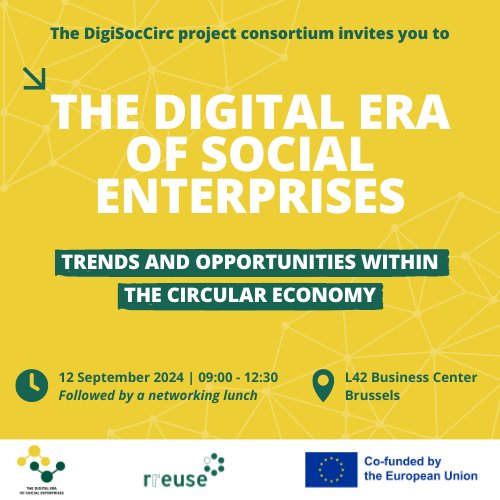The digital era of social enterprises: Trends and opportunities within the circular economy
Digitalisation is on the rise, offering a crucial opportunity to enhance efficiency and visibility. The majority of organisations, companies, and public institutions are embracing digital tools, and social enterprises are no different.
Despite challenges linked to the need for extra funding and upskilling their workforce, many social enterprises are already using digital tools to bolster their circular economy and social inclusion activities. How can we overcome these obstacles and inspire further progress in the sector?
Join the final conference of the DigiSocCirc project led by RREUSE, Europe’s largest network of social enterprises active in reuse, repair and recycling, to dive into the opportunities and challenges in the digital era of social enterprises within the circular economy.
About the project
The DigiSocCirc project aims to support, optimise, and accelerate social circular enterprises’ active role in the digital era. The consortium is composed of 10 individual or national networks of social enterprise partners, all members of the RREUSE network.
At the final conference, the DigiSocCirc consortium will share the project’s key findings and facilitate engaging panel discussions with representatives from social enterprises, businesses, and policymakers. These discussions will showcase project partners’ best practices and initiatives in digitalising social enterprises, such as the implementation of logistics and management tools, digital skills training for workers from vulnerable groups, and the development of second-hand e-commerce platforms. They will outline successful strategies and challenges in accelerating the transition towards digitalising social enterprise activities as a whole.
The project’s objectives:
- Mapping existing digital initiatives and main trends in the reuse and repair sector;
- Identifying impact and opportunity for social inclusion and skills;
- Creating a roadmap for circular and social enterprises to embrace digital tools;
- Promoting cross-border cooperation to develop common collective digital solutions.
You can access the project outputs here, including the project’s case studies and findings report.
Take advantage of this opportunity to gain new insights and expand your professional network!

Practical information
12-09-2024 - 09:00
Rue de la Loi 42, 1040 Bruxelles

Co-funded by the European Union. Views and opinions expressed are however those of the author(s) only and do not necessarily reflect those of the European Union or the European Social Fund Plus (ESF+) programme. Neither the European Union nor the granting authority can be held responsible for them.

